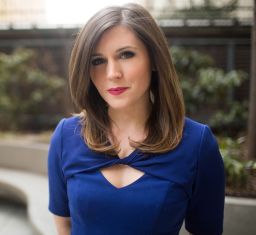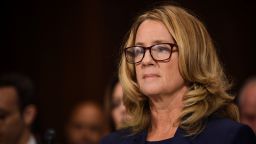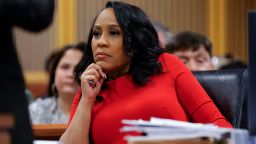Editor’s Note: Jill Filipovic is a journalist based in New York and author of the book “OK Boomer, Let’s Talk: How My Generation Got Left Behind.” Follow her on Twitter. The opinions expressed in this commentary are solely her own. View more opinion on CNN.
You’ve heard the name “Christine Blasey Ford” because of a series of decisions other people made: To nominate Brett Kavanaugh for the Supreme Court. To leak Blasey Ford’s name after she had tried to stay anonymous. To — as infamously alleged by Blasey Ford and denied by Kavanaugh —sexually assault her as a teenager.

Which is not to say that the events which made her a public figure were entirely out of Blasey Ford’s control. She made a big decision, too: to step forward and speak up about what she says happened to her at the hands of a man who is now among the most powerful in the country. But all that followed —from public testimony to death threats and smear campaigns, being mocked by a sitting president and becoming a feminist symbol and a household name – all of that was well beyond anything Blasey Ford could decide or control.
She is a woman who knows the power of a story, having heard so many told about her and seeing her own so thoroughly escape her grasp. In her new memoir, “One Way Back,” she claws back ownership not just of the narrative that brought her name onto our TV screens and the pages of our newspapers, but of her, the woman who had never before in her life been known as “Christine Blasey Ford” (she had only been “Chrissy” and “Christine Blasey” and “Dr. Blasey” and just “Blasey”).
“One Way Back” details Blasey Ford’s childhood in a working-class family living in a tony Maryland suburb, her move out west to flee the stuffy and stifling power structures of the DC-adjacent, her love of surfing, her love of music (mostly grunge). And, of course, it tells the story of how she became the Christine Blasey Ford whose name is now indelibly tied to Brett Kavanaugh’s, a man she surely would have liked to have never heard of.
More than the what-happened, though, “One Way Back” is an exercise in empathy and in reconsidering. Blasey Ford wrote it at an interesting moment, now that the storm has passed and she has largely become a woman whose name is familiar but is no longer plastered across their TV screens. Perhaps some who hear her name might even say: “Who is that again?”
You can feel her terror and understand the trauma she carries with her after a period in which she faced such extreme threats that pushed her to leave her home and hire security; you can also feel the work she’s done to reorganize these events in her mind so that she can break through the emotional intensity and make them make sense. She articulates her fear and guilt (she has two sons and a husband who were also put through the wringer with her), but also a strong sense of purpose and reason. Stunningly, she expresses a sense of compassion for just about everyone in her story, including those who badly wronged her.
She even extends her concern to Kavanaugh: When she hears protesters had gathered outside of his DC home, she worries about how his children must feel. “I found it so strange that both sets of kids, mine and Brett’s, were having to experience such hatred pointed at their parents.” She hoped, she writes, that no one was threatening his daughters.
Blasey Ford is a talented scientist, a loving mother and an unwitting avatar of the #MeToo movement, but her biggest passion is surfing. She writes about her sport with reverence and her memoir takes on the placid blue tone of the sea. Even as big waves come and even as some of them knock her down, you can feel her learning to right herself, learning to float on.
What’s perhaps most effective about “One Way Back” is that Blasey Ford does not take on the voice of an impassioned activist. She doesn’t try to impart a clear and singular lesson. She guides the reader through the improbable and horrifying circumstances she faced and she evaluates and re-evaluates her role and reaction to them.
The reader gets a sense of a woman who is profoundly sensitive, deeply thoughtful, resistant to seeing the world rendered in black and white, simply trying to do the right thing and often second-guessing herself.
“I was not, as so many articles were referring to me as, ‘a badass,’” she writes. “I’d been a good girl who followed the rules, and look where it had gotten me.” Perhaps, she writes, she should have been a little more like the feminist activists who protested and objected and didn’t play by the old rules of decorum and politeness.
She still carries obvious wounds and she gently invites the reader to look at both the damage and the healing. “I have to remind myself constantly that I am the one writing this book and that my words will not be restated in a different way or printed without my approval,” she writes, carrying the scars of media outlets and powerful figures molded her words into what they wanted. “I still can’t seem to wrap my head around the fact that this time I’m in control.”
Sexual assault, many experts say, is as much about the physical violation as the loss of control. Recovery involves regaining a sense of control over one’s body – taking back the autonomy that someone else tried to strip away. Blasey Ford experienced that same theft of autonomy when her story went public and when she became not a complex human being with a story to tell but the embodiment of whatever various political teams needed her to be: a feminist badass, a brave truth-teller, an attention-hungry woman taking down a good man.
Reading her recounting of that particularly painful period, it’s clear how far Blasey Ford, the real person, became flattened and then often distorted, for others’ ends. Even years later she feels it, sometimes in flattering ways that also make her proud – being rendered a feminist hero – and sometimes in frightening ones, like when stone-faced strangers tell her they know who she is.
If one thing from her memoir is clear, it’s that virtually none of us watching through our television screens, even those who applauded and supported her, knew who she was.
“Working through this alone, I’ve reached my greatest sense of empowerment in an unlikely place: the abyss,” she writes. “Where even if no one on earth were to believe you, you know it still happened. No one can take that away from you.”
Much has been taken from Blasey Ford: Her privacy, her sense of safety, her anonymity. Those of us who followed the news coverage of her story may think that we know it. In truth, we only saw a tiny fraction of what she was living. Her memoir doesn’t just set the record straight, it tells her story her way, not as a feminist hero or a truth-telling badass, just a woman who was pushed far out to sea and was determined to grab control of her board and paddle her way back in.


